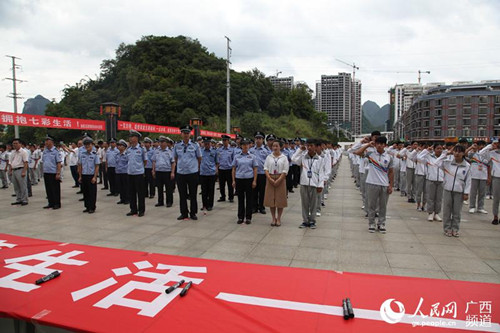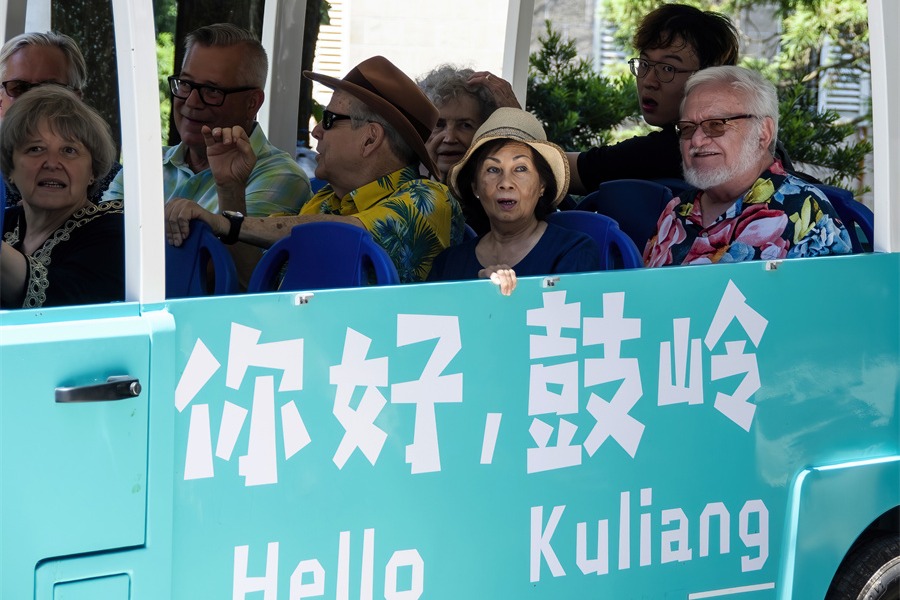Drug-abuse by even a star is a crime
By Zhang Zhouxiang | chinadaily.com.cn | Updated: 2017-12-25 13:22

Hechi Guangxi Zhuang autonomous region launches a one-month anti-drug campaign starting from June 23, 2017. [Photo/gx.people.cn]
"Will anybody care if I die?" This is what Kai Ko, a Taiwan actor and singer, wrote on his social network account around 4 am on Saturday. What made his post controversial was the fact that Ko's career suffered a setback after he was caught taking drugs in 2014.
Ko soon deleted the post, but his statement has been reposted many times on mainland social websites. And although Ko had posted a picture of red lips along with his message, hinting at a love affair gone wrong, his statement drew thousands of criticisms, mostly highlighting his drug abuse in the past.
The most reposted public reaction is: "No, at least we don't (care if you die). Taking drugs has already ruined your image … perhaps you should consider changing your profession." This in turn has sparked another debate on cyber-bullying.
Using abusive terms to criticize Ko is indeed cyber-bullying, which is not acceptable and even punishable according to relevant laws. But if a person criticizes a star using plain language, he or she is just exercising his/her freedom of expression.
According to China's laws, drug-trafficking is a crime that can even invite capital punishment, while drug-abuse invites detention and mandatory drug rehabilitation, which allies to all irrespective of their social and economic status. However, celebrities or public figures who use drugs cause much more social harm than ordinary drug-users, because of the their huge influence on society, especially on their fans. Such celebrities also make it more difficult to combat drug abuse, let alone rooting out the drug menace altogether.
That's why a celebrity caught using drugs on the Chinese mainland suffers almost irreparable career damage. Playwright Ning Caishen, director Zhang Yuan, rising singer Li Daimo, among dozens of others, disappeared from public life after being caught taking drugs. When news reports in May said Ko was set to act in a mainland TV drama, he was severely trolled on social media.
Ko was caught taking drugs in August 2014, yet he made a comeback in the Taiwan entertainment industry after just over one year. Another few months later, he starred in a mainland TV drama. But not even for once did he say that he had given up drugs.
So did Ko check into a drug-rehabilitation center?
Zhang Tiankan, a medical researcher-turned "medical-pop" writer, said it generally takes more than one year for a drug addict to completely give up drugs, stressing that it is important for a drug addict to change his lifestyle and circle of "friends". "A person is highly likely to start using drugs again if he/she cannot change the two", Zhang said.
Does this mean Ko never stopped using drugs? Of course, Ko, along with other celebrities, had appeared in an anti-drug advertisement in 2012 in which he declared: "I don't use drugs." But that was before he was caught using drugs in 2014.
In this age of information, a celebrity cannot hide an offense he or she commits. Moreover, when a star breaks the law or social norms by, say, using drugs, it is natural for people to more severely criticize him or her. Perhaps Ko really needs to rethink about his career. And if he wishes to continue being a singer and actor, he needs to publicly announce that he has stopped using drugs — if indeed he has — to regain public trust.
The author is a writer with China Daily. zhangzhouxiang@chinadaily.com.cn
























